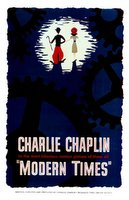09/10/06 Modern Times
 Modern Times (1936), directed by Charles Chaplin
Modern Times (1936), directed by Charles Chaplinwatched solo; DVD rental (North American Video) @ home; suggested by Mike A.
Chaplin remains one of those lasting icons of American cinema and comedy, and his simplistic yet affecting style captivates audiences even to this day. He had very early on in the cinematic world rocketed himself into the limelight by portraying his empathetic character, The Tramp, across to the entire country who where desperate for something happy in a situation that was so negative. His goofy facial expressions and body language spoke volumes to a nation firmly planted in an economic Depression, that was trying in vain to keep a positive outlook. His ragged attire was symbolic of the living conditions of many in his time (although, if you want to get very deep about it...he was probably one of the very few people of that era who had really no worries about finances and wealth...as he became rich on the very senses that he was portraying...not in any mean-spirited way, but very ironic don't you think?). And his carefree spirit and ridiculous antics gave millions a reason to laugh and step outside of themselves for a moment of emotional freedom. All of this, with predominantly silent filmmaking and elaborated set design and costuming. Some of his films are landmarks in not only cinematic value, but sheer iconic imagery that will never be lost on a movie-going world (i.e. Chaplin's famous gear grinding contortions inside the mechanisms of a factory machine). In this silly comedy, filled with constant real-life reminders of the nation's plight, Chaplin begins as a factory worker who can't quite seem to do anything right (think Lucille Ball's later "I Love Lucy" production line, chocolate eating routine)...and is promptly tested and then let go into a mental hospital. Upon his release, his many wanderings have him mistaken as a Communist, foiling a jailbreak, starting as a night-keeper of a department store, and becoming friends and falling madly in love with a young homeless woman. One escapade after another gets him into loads of trouble, but the hopeless sap seems to find a way out in the end...on to a better life. It's a beautifully simple, tragic tale of comedy that could not have been written better than by the tramp poet Chaplin. This particular film is also landmark in that it is the first and only instance where Chaplin speaks in a film (I think there's some French singing involved)...happening in a time when most films were moving towards "talkies" anyway. Always the offbeat genius.
5 out of 5 stars

0 Comments:
Post a Comment
<< Home